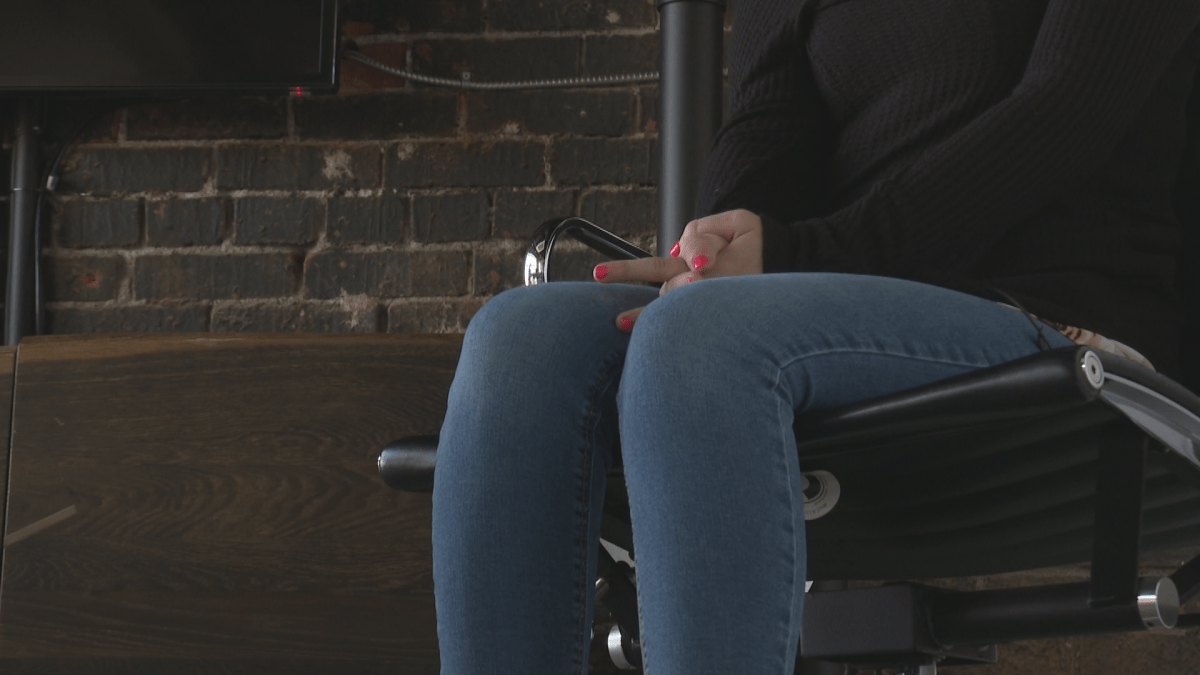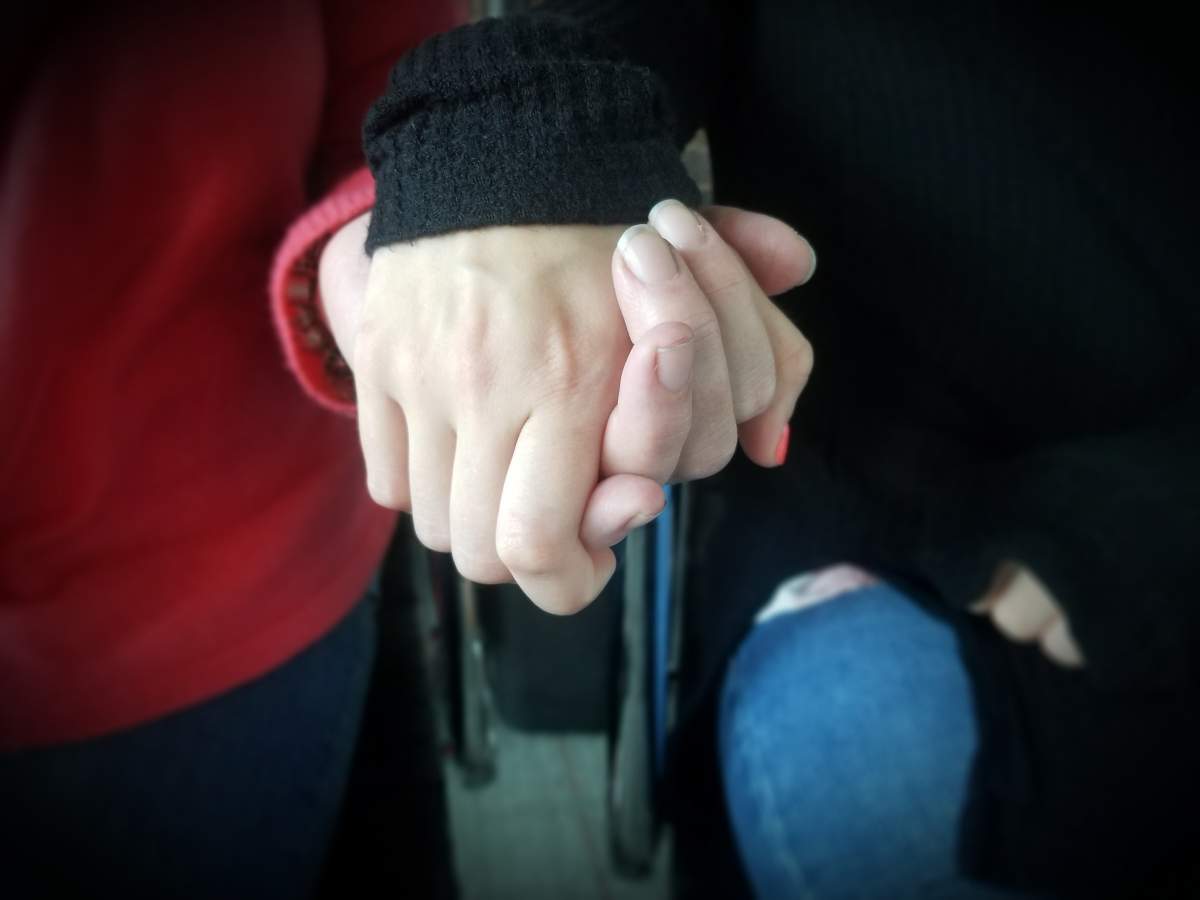Editor’s note: This story deals with disturbing details of human trafficking and the sexual abuse of a minor. Reader discretion is advised.

According to Pamela Rubin, a sexual violence trauma therapist, few crimes are as cruel and insidious as human trafficking.
“Trafficking survivors have been put through some of the most severe trauma that anyone can survive, and many don’t survive,” she said, having counselled dozens of survivors in Nova Scotia alone.
“What they’ve lived through is often a combination of rape, domestic violence, coercive control, assault, kidnapping. … It’s a serious ordeal that leaves many lasting marks.”
Chelsea is a human trafficking survivor who bears those scars — literal and figurative — and recently spoke to Global News about her experience in taking the perpetrators to court. Global News is calling her Chelsea because her real name is protected by a publication ban.
The young woman, who was forced into prostitution at the age of 16, described how it felt to relive her trauma in front of a judge, have her character attacked by defence counsel, and be made to feel like what happened to her was her fault.
The two people who allegedly trafficked Chelsea were arrested in 2016. One of her traffickers, Kyle Pellow, pleaded guilty to human trafficking in 2018 and was sentenced to six years in prison, less time spent on remand. He was granted day parole in 2019, then left on a statutory release in May 2020.
Her other alleged trafficker, Renee Webber, was found guilty of human trafficking in 2018, but her conviction was overturned, meaning the charges haven’t been proven conclusively. A new trial was ordered and is scheduled to begin in April 2022.
After years of trying to piece her life back together, Chelsea is gutted by the prospect of reopening old wounds.
“I thought that this was all over when we had the last trial, and I thought that things would start to go back to normal for me and I could finally start to heal and move past this and move on with my life,” she said.
“But just like the situation that I was in, it just drags you down and it just is never-ending.”
Healing ‘put on hold’
That’s a common experience for human trafficking survivors who go through the court process, which can take several years, Rubin said.
Even after escaping their situations, victims of human trafficking face an uphill battle while seeking justice.
“People’s healing from the deep wounds of trafficking and prostitution are put on hold. They can’t really even start because of the burden and the re-triggering of this very lengthy process,” she said.

Rubin said there are ways to get a conviction without relying on victim testimony, a process that can severely re-traumatize them.
“Instead of putting victim witnesses in the hot seat and pinning the whole mechanism on very vulnerable people, these cases need to have the resourcing that murder cases get,” she said.
“So investigations and evidence collection can occur without victim witnesses.”
The provincial victim services program, tasked with providing information, assistance and support to victims in the courtroom, is ill-equipped to deal with these cases, Rubin said.
“There should be 24/7 on-call access to support. There should be 100 per cent accompaniment to every court date,” she said.
Nova Scotia’s department of justice declined an interview request for victim services, but in a written statement, spokesperson Heather Fairbairn said the province has doubled its number of specialized human trafficking victim services navigators.

Get daily National news
When the new positions are filled, that brings the total to four for the entire province.
“We believe, from that initial work, that this is the right amount, but we’ve got to get it operationalized and see if it does meet the needs or not,” said Justice Minister Randy Delorey, responding to Global News’ questions after a cabinet meeting on July 8.
“We’re continuing to add resources and support for the victims of human trafficking, and this is an important area that we have work to do to improve.”
Not enough funding for counselling
Fairbairn writes that victim services “use a human-centred, trauma-informed approach” to support survivors through the court process, but Chelsea’s mother says that hasn’t always been the case for her and her daughter.
At times, she said no one has accompanied them to court and they haven’t always been kept in the loop on court dates associated with her daughter’s alleged traffickers.
Chelsea’s mother, who Global News is calling Angela, also says she’s maxed out all the funding available through the province’s Criminal Injuries Counselling Program, which is capped at $2,000 for a two-year period from the date it is awarded.
“I was denied in an email, told that I couldn’t receive any more funding, that I reached my limit, but that I could take my daughter’s funding and use it towards myself,” she said.
“And I refused to do that.”

Rubin said more financial support needs to be provided to the victims and their families — not only for counselling, but for the costs associated with attending court, such as parking and transportation.
“All these things add up for people who are often living in poverty,” she said.
Most trafficking charges never resolved
According to Statistics Canada’s 2019 report on human trafficking in Canada, the vast majority — 89 per cent — of human trafficking court charges in 2018-19 were stayed, withdrawn, dismissed or discharged.
“Less than one in 10 (seven per cent) charges resulted in a guilty finding,” it said. “In comparison, 31 per cent of all violent offence charges completed the same year resulted in a finding of guilt.”
Those numbers are not surprising to Rubin, who noted that other types of sex offences have low rates of conviction as well.
“We have to reckon with the fact that our justice system is a colonial-based, sexist system,” she explained.
“It is not in place to address racial injustice; it is not in place to address violence against women primarily. So we have to consciously think about the structural problems that make that the case for all crimes against women and girls.”
Nova Scotia, one of Canada’s smallest provinces, has the highest reported rates of human trafficking in the country. In 2019, Halifax had the second-highest number of reported incidents, after Toronto.
Advocates say there are several possible explanations, including a lack of opportunities, high poverty rates, and the systemic marginalization of girls, women and members of racialized communities, who are at greater risk of being victimized.
Another glaring contributor is a “culture in Nova Scotia that’s embedded in silence,” adds Linda MacDonald, co-founder of the advocacy group Persons Against Non-State Torture.
The organization is based out of Truro, which is known as a hub of human trafficking in Nova Scotia.
“Men have to be part of the solution because they’re, sadly, a big part of the problem right now, because the majority of the buyers are men and men remain silent about human trafficking,” she said.
“The men that know better have to speak out … if men challenge other men, they listen.”
Cracking down on the buyers
In order to truly address this issue, added co-founder Jeanne Sarson, more attention needs to be paid not only to pimps, but their customers as well.
“If we cut the demand, then the human traffickers aren’t going to make any money because that’s how human trafficking, or human traffickers, exist,” she said. “If you stop the buyers, then the traffickers will leave.”
Rubin agreed.
“We need to be taking an ‘end demand’ approach. Otherwise, we are just catching a tiny fraction of people downstream,” she said. “It’s pointless.”
Since much of the communication that happens between johns and trafficking victims happens over text and online, Rubin said police need to use that information to find the buyers.
“When it just disappears into the wind, that’s a tremendous blow for survivors,” she said.
Global News sent multiple interview requests to Halifax Regional Police and the Nova Scotia RCMP about how they investigate human trafficking, but no one was made available.
Kelly Regan, the minister of community services and the minister responsible for the status of women, told Global News earlier this month that she’s not sure how her government can crack down more on the buyers.
“I don’t know that we’ve gone to that point yet, but certainly we are focused on letting people know what to watch out for,” she said. “But that’s a really good point.”
To date, the provincial government says it has spent more than $4 million a year to address human trafficking and sexual exploitation within its borders. Last year, it committed another $1.5 million to that annual pot for the next five years, as it expands its programs that support survivors and youth at risk — particularly in rural, African Nova Scotian and Mi’kmaq communities.
But more needs to be done, said Angela, to ensure survivors feel safe and protected by the justice system — otherwise, they may not come forward at all.
“I think that we need more training for lawyers, defence lawyers, on how they treat victims on the stand,” she said. “For days, my daughter would come out of the courtroom crying.”
Meanwhile, Chelsea is steeling herself for the upcoming trial, where she’ll face her alleged trafficker a second time. While it’s been a difficult process for her and her family, she wants to share a message of hope with others who may be going through what she did.
“It might feel like you have no power or control over your life, but if you can find the courage … to get away from them for even five minutes to tell somebody what’s going on, that could save you, your life,” she said.
“It’s not your fault, and you didn’t choose this for yourself, and it doesn’t have to be your future.”
Survivors of sexual violence in Nova Scotia can contact the Sexual Assault and Harassment Phone Line at (902) 425-1066 for support, 24/7. The phone line is operated by the Dalhousie Student Union. If you believe someone you know is a victim of human trafficking, a list of phone numbers to call and steps to follow is available on the Halifax Regional Police website. Anyone in immediate danger is urged to call 911.













Comments